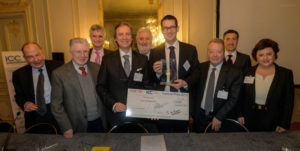
Chamber services
ICC Institute Prize awarded to research on arbitrating tax-related international investment disputes
The International Chamber of Commerce (ICC) Institute of World Business Law today named Arno Gildemeister as laureate of the fourth ICC Institute Prize for his thesis Arbitration of tax disputes in international investment law (L’arbitrage des différends fiscaux en droit international des investissements).

The award ceremony took place at the 33rd ICC Institute of World Business Law annual meeting in Paris.
Open to anyone under the age of 40, the €10,000 ICC Institute Prize is awarded every two years for demonstrating excellent legal writing and making an outstanding new contribution in the field of international commercial law, including arbitration.
The competition jury, made up of ICC Institute Council members, selected Mr Gildemeister’s thesis out of the 14 entries submitted by applicants from four continents on a wide range of issues. The directors of the chosen thesis were professors Emmanuel Gaillard and Gerald Mäsch.
“I’m honoured to receive this prize as the ICC Institute has always been at the forefront of academic discussions about international arbitration,” said Mr Gildemeister, a doctor of law and lecturer at the University of Versailles Saint-Quentin (France). “I’d be happy if, through the ICC Institute, my thesis contributes to stimulating discussions about the arbitrability of tax disputes.”
Original topic
“Arno Gildemeister’s thesis is a work of high quality, extremely well structured and drafted, and deserving top grades,” said Ercüment Erdem, Council member of the ICC Institute and Chair of the Institute Prize Jury, and Chair of the Jury. He appreciated the topic’s originality: “Although investment disputes are regularly studied, this is not always the case for fiscal disputes. This impressive work discusses, on the support of a remarkable number of pertinent cases, whether and to what extent foreign investors are protected in respect of the fiscal sovereignty of the host states.”
Describing his research as “a long and winding road”, Mr Gildemeister thanked his wife for her “unwavering support throughout the years”. It all started back in 2003 when, while studying for a masters in international commercial disputes, he was intrigued to learn that the Organisation for Economic Co-operation and Development was considering including an arbitration provision into its model tax treaty.
Mr Gildemeister decided to focus his studies on investment arbitration while working on a large investment arbitration case during an internship at Shearman & Sterling in 2004. He recalled: “I wondered whether it was possible to compare tax treaty arbitration with investment arbitration. I proposed the topic to Professor Gaillard, and was enthused when he accepted to supervise my thesis. At the time the first high-profile, tax-related investment disputes were decided, and suddenly more and more cases became public, raising complex questions of public international law, with important political incidences.”
Mind-expanding
For Mr Gildemeister, who wants to donate part of the €10,000 award to the Malala Fund for supporting girls’ education in developing countries, “the biggest prize is the expansion of one’s mind”.
He encourages law students taking part in future ICC Institute contests to “follow their curiosity and investigate every question that arises, regardless of whether it has been raised by others before”.
The ICC Institute Prize was launched in 2007 to encourage focused research on legal issues affecting international business, contributing to the understanding and progress of international commercial law around the world.
Chair of the Jury Prof. Erdem said: “With the globalization and liberalization of markets, the international trade community requires more speedy, reliable and efficient solutions to disputes deriving from international trade. In most cases, international trade community complaints relate to applicable law, jurisdiction of courts, enforcement of court decisions or arbitral awards. The solutions to these problems have to be based on a scientific approach.”
How does this research help companies trade internationally? “Most research on international commercial law is conducted as a comparative law study allowing the actors of international trade to know more about the application of international commercial law instruments in different jurisdictions,” explained Prof. Erdem. “These types of studies give certainly more foreseeability for the international trade community, in a scientific and transparent manner.”

